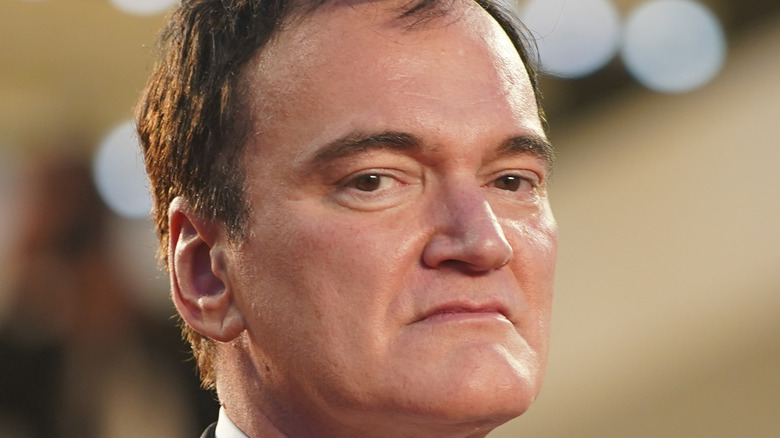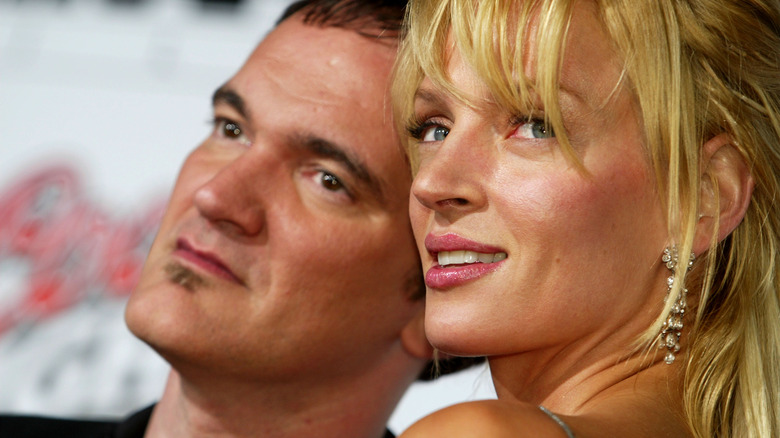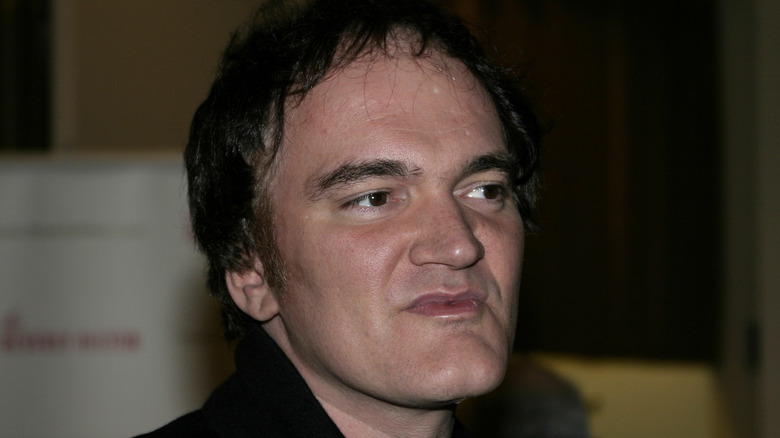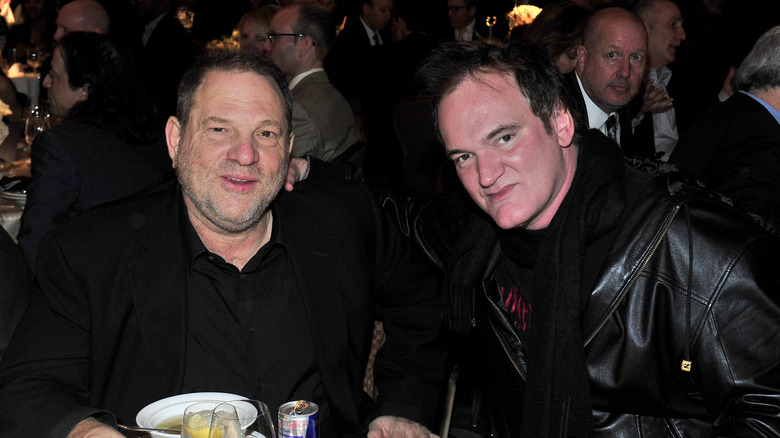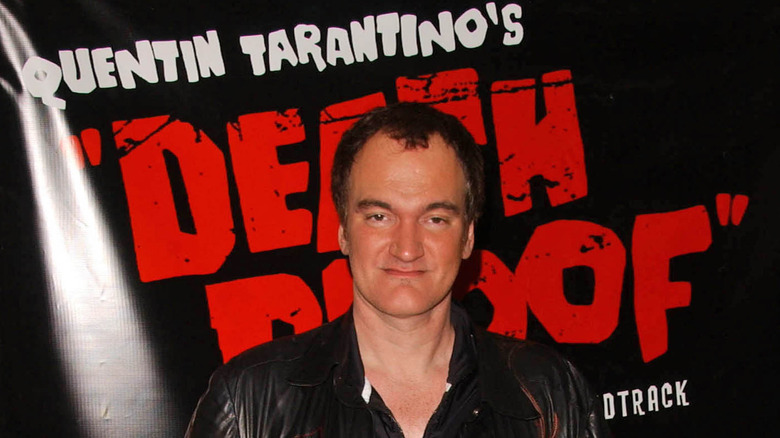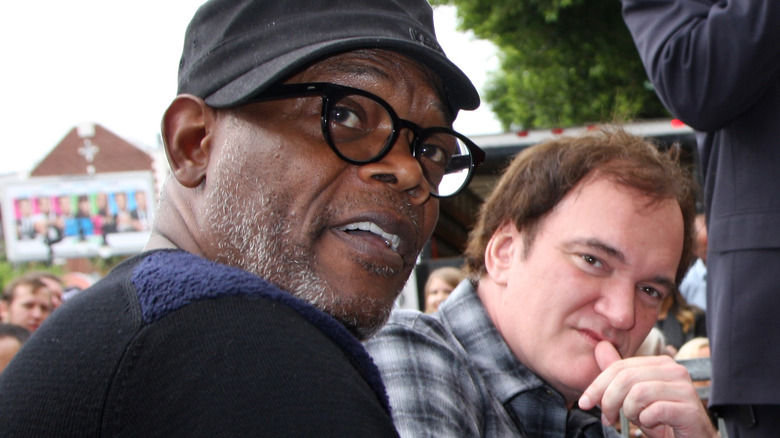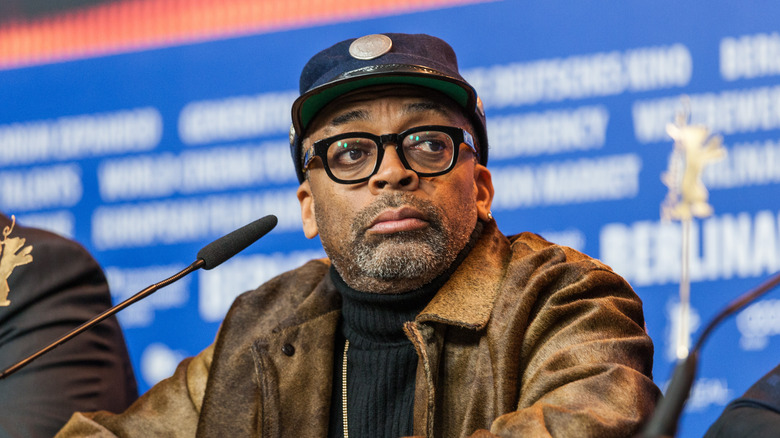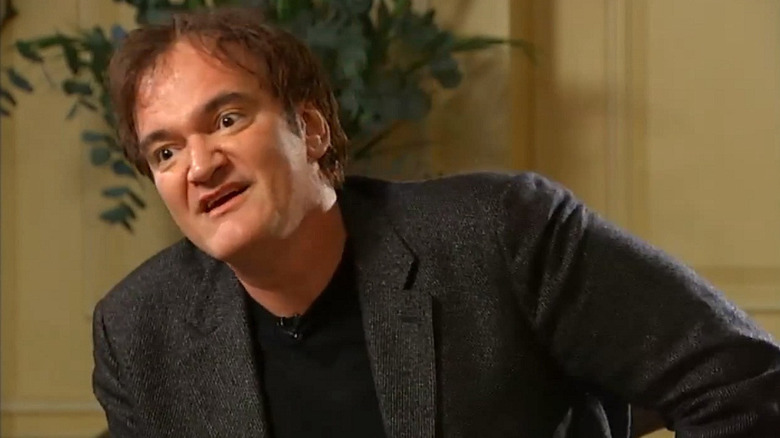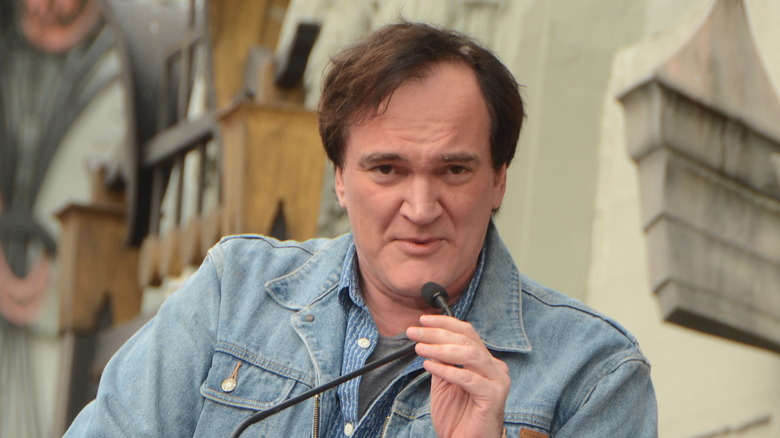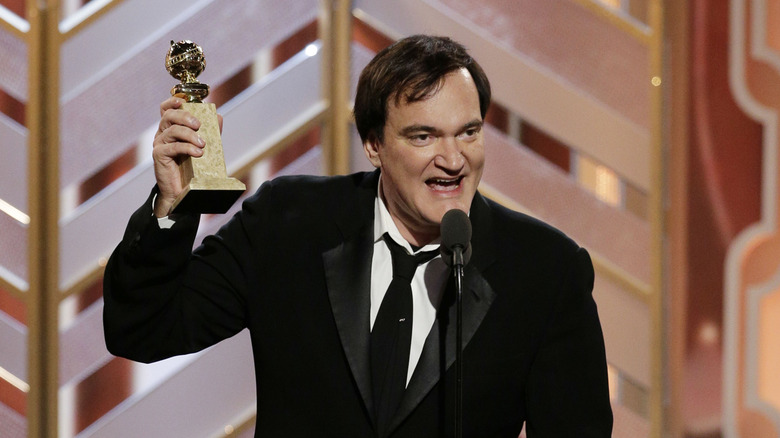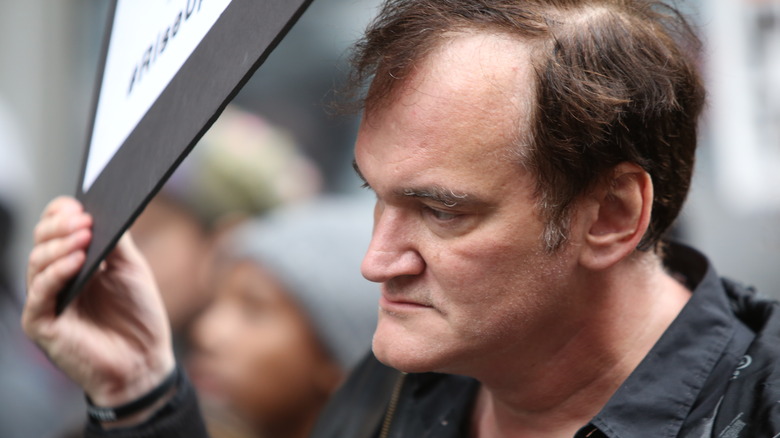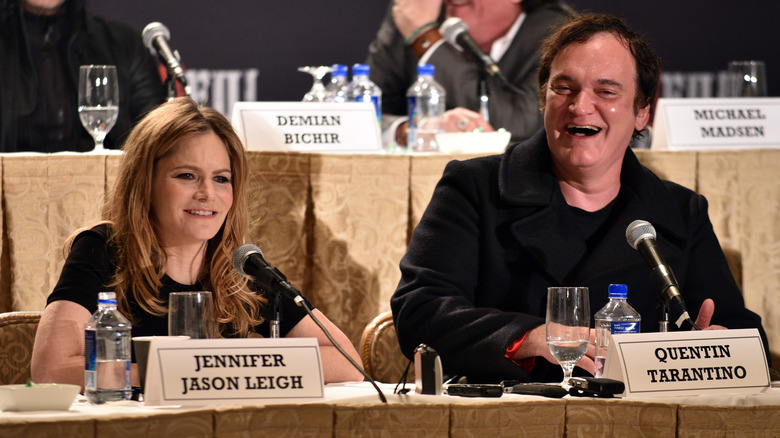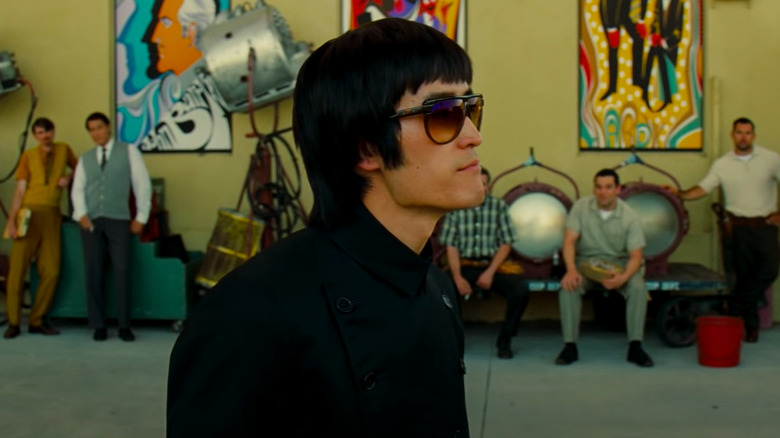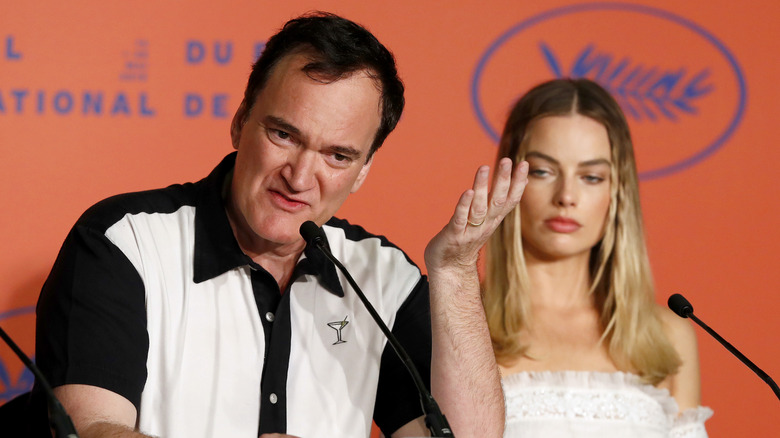Quentin Tarantino's Most Controversial Moments
He's one of the most revered filmmakers of his generation, but two-time Academy Award winner Quentin Tarantino has ruffled more than a few feathers throughout his meteoric rise. The director of films like "Reservoir Dogs," "Pulp Fiction" and "Inglourious Basterds" famously worked at a VHS rental store in California before hitting the big time, gaining a reputation locally for his encyclopedic film knowledge. He called the experience "a primer to what it would be like to be famous" in an interview with Entertainment Weekly. "Everyone in Manhattan Beach knew who I was," he said. "I couldn't walk down the street without people calling, 'Hey, Quentin!'"
Today, he's famous the world over, and with that comes extra scrutiny, both from the press and from his peers. He's known as the brains behind several modern classics, but Quentin Tarantino has also become one of Tinseltown's most controversial figures over the course of his career. Let's take a look at why.
Quentin Tarantino clashed with Uma Thurman over an on-set car crash
Rolling Stone called it "a magnificent obsession" in 2004, but Quentin Tarantino's relationship with Uma Thurman was already strained at that point. After impressing with her performance in 1994's "Pulp Fiction," Thurman took the lead role in Tarantino's two-part revenge epic "Kill Bill," and things went great, to begin with. Tarantino lost the trust of his muse towards the end of the shoot, however, as Thurman told The New York Times. According to the actor, she was made to shoot a driving scene in a car she felt was unsafe. "Quentin came in my trailer and didn't like to hear no, like any director," she said. "He was furious because I'd cost them a lot of time. But I was scared. He said: 'I promise you the car is fine. It's a straight piece of road.'"
Her fears were realized when the car veered off the road and into a tree. "I felt this searing pain and thought, 'Oh my God, I'm never going to walk again.'" There was an "enormous fight" when she returned from the hospital, and the rift escalated when Thurman was refused access to the tape. 15 years would pass before the crash footage saw the light of day. "Not that it matters now, with my permanently damaged neck and my screwed-up knees," Thurman added. A remorseful Tarantino called the incident his "biggest regret" in a follow-up interview with Deadline.
Quentin Tarantino made a public apology after comments about Roman Polanksi's victim
It's rare for Quentin Tarantino to unreservedly apologize for something he's said, but he did exactly that when comments he made about Roman Polanski in 2003 resurfaced in 2018. Tarantino was speaking to Howard Stern when he adamantly defended the Polish-French director, who fled the States in 1978 while awaiting sentencing for unlawful intercourse with a minor, 13-year-old Samantha Geimer. "It was statutory rape," Tarantino said. "He had sex with a minor. That's not rape. To me, when you use the word rape, you're talking about violent, throwing them down — it's like one of the most violent crimes in the world."
Stern and co-host Robin Quivers were both aghast at what they were hearing from Tarantino, who went on to call Geimer a "party girl" who wanted to have sex with Polanski. "She wanted to have it and dated the guy," he said. "We're talking about America's morals, not talking about the morals in Europe and everything." Days after the shocking audio resurfaced, Geimer told the Daily News that Tarantino "was wrong" to suggest that she gave consent and that she "would probably feel better" if he admitted as much. The filmmaker called her to apologize in person and released a statement to IndieWire. "I realize how wrong I was," he said. "Ms. Geimer WAS raped by Roman Polanski."
If you or someone you know may be the victim of child abuse, please contact the Childhelp National Child Abuse Hotline at 1-800-4-A-Child (1-800-422-4453) or contact their live chat services.
Quentin Tarantino 'knew enough to do more' about Harvey Weinstein
Quentin Tarantino's professional relationship with Harvey Weinstein resulted in numerous critically and commercially successful pictures, but the filmmaker regrets not calling his producer friend out on his predatory behavior. Two weeks after The New York Times broke news of Weinstein's crimes in a bombshell report, Tarantino told the same publication that he should have acted at the time. "I knew enough to do more than I did," he admitted. "There was more to it than just the normal rumors, the normal gossip. It wasn't secondhand. I knew he did a couple of these things." He added: "I wish I had taken responsibility for what I heard."
Weinstein was found guilty of two charges related to sexual assault and sentenced to 23 years in prison in March 2020, though questions about Tarantino's relationship with him haven't gone away. When he sat down for a candid interview with Joe Rogan on his podcast "The Joe Rogan Experience" in June 2021, he said the disgraced movie mogul was like a "f***** up father figure" to him. "I wish I had sat him down and gone, 'Harvey you can't do this, you're gonna f*** up everything,'" Tarantino said. "I don't think anybody talked to him about it."
If you or anyone you know has been a victim of sexual assault, help is available. Visit the Rape, Abuse & Incest National Network website or contact RAINN's National Helpline at 1-800-656-HOPE (4673).
He cut Mickey Rourke from a movie because he didn't like his agent
Quentin Tarantino addressed a number of his past controversies during his 2021 interview on "The Joe Rogan Experience," confirming a longstanding rumor about his 2007 film "Death Proof." Released alongside Robert Rodriguez's "Planet Terror" as part of the double feature "Grindhouse," the film stars Kurt Russell as a killer Hollywood stuntman who murders his victims with staged crashes. It's hard to imagine anyone other than Russell in the role once you've seen the film, but Stuntman Mike was originally supposed to be played by Mickey Rourke.
When prompted by Rogan, Tarantino revealed that Rourke (fresh off his appearance as Marv in "Sin City") was up for the part and some promising discussions were had, but his "agent was f*****g around with us," Tarantino claimed (via The Hollywood Reporter). "I [said], 'Here's one of the offers, you have until 9 p.m. Friday night to accept or reject,' and they let the deadline blow by." That was apparently enough for Tarantino to rule Rourke out completely. "The agents were like, 'Oh they need him, so we can do anything we want.' Whenever agents treat me like that, I pull the plug. They're arsonists disguised as firemen."
Tarantino's use of the N-word has divided opinion
The history of Quentin Tarantino's beef with fellow filmmaker Spike Lee dates back to 1997, the year "Jackie Brown" was released. The film (which stars Pam Grier as a flight attendant-turned-money smuggler) was praised by the majority of critics, but Lee took issue with what he deemed the writer-director's excessive use of the N-word. It's used a total of 38 times in the movie. "Some people speak that way, but Quentin is infatuated with that word," Lee told Variety. "What does he want to be made, an honorary black man? I want Quentin to know that all African Americans do not think that word is trendy or slick."
Lee's comments received some support, though not from "Jackie Brown" star Samuel L. Jackson. "Black artists think they are the only ones allowed to use the word," Jackson, who plays gun runner Ordell Robbie in Tarantino's third film, told Jet Magazine. "Well, that's bull. This film is a wonderful homage to Black exploitation films. This is a good film. And Spike hasn't made one of those in a few years." Tarantino wasn't happy with Lee's remarks, either. "As a writer, I demand the right to write any character in the world that I want to write," he responded during an interview with Charlie Rose (via The Conversation). "And to say that I can't do that because I'm white ... that is racist."
Spike Lee called Tarantino's slavery movie 'disrespectful'
If Spike Lee thought the use of the N-word in "Jackie Brown" was excessive, it's no wonder he took to social media after hearing about "Django Unchained," in which the racial slur is utilized over a hundred times. Lee made his position on Quentin Tarantino's slavery saga clear in the days leading up to its premiere. "I'm not gonna see it," he told Vibe TV. "All I'm going to say is that it's disrespectful to my ancestors." He later went online to express his outrage over the film, stating that "American slavery was not a Sergio Leone Spaghetti Western" in a now-deleted tweet. "It was a Holocaust. My ancestors are slaves. Stolen from Africa. I will honor them."
When Tarantino was asked about Lee's comments at the European premiere of "Django Unchained," he simply said he wouldn't "waste time" by responding, the ANSA news agency said (via UPI). According to "Django Unchained" star Jamie Foxx, he spoke to Lee about the film in person when he saw him at the BET Awards. "You know Spike, he'll let you have it whether it's good, bad or ugly," the actor told Vibe. "And he said, 'I'm not going to say anything bad about this film. It looks like y'all are getting it.'" As of this writing, there is no word on whether Lee has actually watched the film yet.
Quentin Tarantino lost it during an interview with Krishnan Guru-Murthy
Quentin Tarantino has given his opinion on the link between movie violence and real-life violence on countless occasions (there isn't one, as far as he's concerned), and he's been known to get irate when pushed on the topic. The writer-director famously lost his temper with Channel 4's Krishnan Guru-Murthy when he attempted to broach the subject during a promotional interview for "Django Unchained" in 2013. "I'm not biting," Tarantino said. "I refuse your question." When pressed further by Guru-Murthy (who would later make Robert Downey Jr. storm out of an interview), Tarantino let rip.
"I'm not your slave and you're not my master," Tarantino snapped. "You can't make me dance to your tune. I'm not a monkey... I don't want to talk about the implications of violence. The reason I don't want to talk about it? Because I've said everything I have to say about it. If anyone cares what I have to say about it, they can Google me. They can look for 20 years what I have to say. I haven't changed my opinion one iota." The angry American unwittingly started a new meme when he told the British journalist: "I'm shutting your butt down!"
His comments about the Sandy Hook school shootings made headlines
Krishnan Guru-Murthy wasn't the only journalist to rub Quentin Tarantino up the wrong way during the promotional run for "Django Unchained." In January 2013, a little over a week after the film's Christmas Day premiere, Tarantino sat down for a radio interview with Terry Gross, host of the NPR show "Fresh Air." The writer-director's violent slavery epic hit cinemas not long after the Sandy Hook Elementary School shootings, in which 20 children and six adults were shot dead by a gunman who then took his own life.
When Gross asked if tragedies like the one at Sandy Hook were making violent films less appealing, Tarantino answered with some questions of his own. He said: "Would I watch a kung fu movie three days after the Sandy Hook massacre? Would I watch a kung fu movie? Maybe, because they have nothing to do with each other." Gross, apparently aware that she'd struck a nerve, suggested that Tarantino seemed "annoyed" by her line of questioning — and he was. "I'm really annoyed," he admitted. "I think it's disrespectful to [...] the people who died to talk about movies. I think it's totally disrespectful to their memory." He added: "Obviously, the issue is gun control and mental health."
Quentin Tarantino's 'ghetto' comparison shocked the Golden Globes
When Quentin Tarantino's use of the N-word started raising eyebrows again following the release of "Django Unchained," leading man Jamie Foxx stood by him. "I understood the text," Foxx told IndieWire. "The N-word was said 100 times, but I understood the text — that's the way it was back in that time." When Tarantino made an ill-advised comment about ghettos at the Golden Globes a few years later, Foxx was less understanding.
Tarantino accepted an award on behalf of Ennio Morricone, who composed the sweeping score to his 2015 film "The Hateful Eight." He began by paying tribute to the Italian maestro, calling him his favorite ever composer. "When I say favorite composer, I don't mean movie composer — that ghetto," he added. "I'm talking about Mozart, I'm talking about Beethoven, I'm talking about Schubert." His use of the word "ghetto" to describe something negative didn't go over very well with some of the stars in attendance — Regina King's face spoke a thousand words, and Foxx, who was hosting, was left in disbelief.
Speaking after a screening of "The Hateful Eight" in Sydney a few days later, Tarantino gave an expletive-laden response to the controversy. He said: "F*** everybody who said anything about that s***!"
Police boycotted Tarantino's films after he spoke at anti-brutality protests
Quentin Tarantino locked horns with the police in 2015, joining protesters at the Rise Up October anti-brutality rally in New York City. The filmmaker spoke to the gathered masses about the death of Tamir Rice, a 12-year-old African American boy who was shot dead by officers in Ohio. "Tamir was playing with a toy gun in the park," Tarantino said, adding that the person who made the 911 call noted that "the gun was probably a fake and the person holding it was probably a juvenile." He also said that "if you believe there's murder going on then you need to rise up and stand up against it."
The renowned filmmaker's words didn't go unnoticed by the police. Tarantino was dubbed a "cop hater" by Patrick J. Lynch of the New York City Patrolmen's Benevolent Association, who called for a boycott of his movies (via The New York Times). Police groups in Philadelphia and Los Angeles soon followed. "There is no place for inflammatory rhetoric that makes police officers even bigger targets than we already are," said Craig Lally of the Los Angeles Police Protective League. Tarantino claimed his comments had been taken out of context to "demonize" him in an interview with the Los Angeles Times. "All cops are not murderers," he said. "I never said that. I never even implied that."
Quentin Tarantino doesn't discriminate when it comes to violence
One of the criticisms of Quentin Tarantino's divisive Western "The Hateful Eight" was his treatment of Jennifer Jason Leigh's character, Daisy Domergue. An outlaw who Tarantino described as "a Manson girl out West" in a USA Today interview, Daisy spends the majority of the movie shackled to John "The Hangman" Ruth, a bounty hunter played by Kurt Russell. Ruth hits his prisoner repeatedly during the film, and the onscreen abuse left a bad taste in the mouths of several critics. RogerEbert.com's Laura Bogart called it "hipster misogyny" in her review, while Juliette Peers (via The Conversation) wrote that the film's "sexual politics seem bleakly conservative." Tarantino later addressed the backlash on "The Joe Rogan Experience."
"It's bulls***," he told Rogan (via The Hollywood Reporter). "There's nothing that happens to her that couldn't have happened to a man in that same situation. If instead of Daisy Domergue, it's ... a man who's 250 pounds [with] a big Grizzly Adams beard, you wouldn't think s*** about Kurt Russell smacking him all the time." He went on to say that he's "not playing f****** favorites" in the film and that Daisy Domergue is "just as bad" as the other characters. He admitted that seeing a woman being constantly beaten "makes it a little harder to watch," but that was his goal. "It's a f****** rough movie," the defiant director added. "It's supposed to hurt."
Quentin Tarantino stood by his controversial version of Bruce Lee
While the two main characters in the 60s-set "Once Upon a Time in Hollywood" — aging actor Rick Dalton (Leonardo DiCaprio) and his no-nonsense stuntman Cliff Booth (Brad Pitt) — are fictional, Quentin Tarantino's ninth movie also features some very real stars of the day. Margot Robbie is perfect as Sharon Tate, Damian Lewis is eerily convincing as Steve McQueen, but the best lookalike of the lot was undoubtedly Mike Moh as Bruce Lee. Moh's version of the martial arts movie icon loses a fight with Brad Pitt's Cliff Booth in one memorable scene, which angered Lee's daughter.
Shannon Lee called Tarantino out for portraying her dad as "an arrogant a–hole who was full of hot air" in a statement she gave to The Wrap. "I understand they want to make the Brad Pitt character this super bad-a** who could beat up Bruce Lee, but they didn't need to treat him in the way that white Hollywood did when he was alive." According to Tarantino, his depiction of Lee was based on actual accounts of his behavior. "Bruce had nothing but disrespect for American stuntmen and was always hitting them," he told Joe Rogan on "The Joe Rogan Experience." He also said that while he "can understand his daughter having a problem with it," everyone else could "go suck a d***."
Tarantino tangled with a reporter over Margot Robbie's Sharon Tate
Margot Robbie's turn as Sharon Tate (who, in Quentin Tarantino's "Once Upon A Time in Hollywood," isn't murdered by Charles Manson's followers as she was in real life) was generally praised by the critics, though some were left a tad underwhelmed by her lack of dialogue in the movie. When Tarantino and the movie's principal cast spoke to reporters following its premiere at the Cannes Film Festival, Farah Nayeri of The New York Times asked why Robbie had so few lines, saying that it "must have been a deliberate choice" on his part. A stony-faced Tarantino fired back with: "I just reject your hypotheses."
An awkward beat followed Tarantino's blunt response, but Margot Robbie alleviated the tension when she chimed in with her two cents on Sharon Tate's scenes. "I think the moments that I got onscreen gave an opportunity to honor Sharon and the lightness," the Australian A-lister told Nayeri. "I don't think it was intended to delve deeper. The tragedy, ultimately, was the loss of innocence, and to really show those wonderful sides of her, I think, could be adequately done without speaking. I did feel like I got a lot of time to explore the character, even without dialogue." Nice save, Margot.

